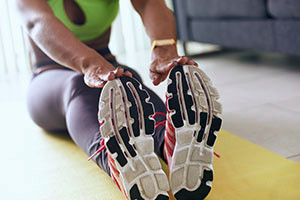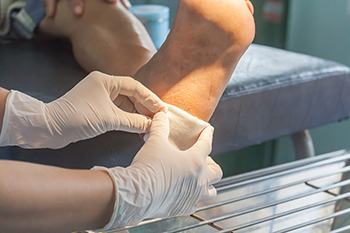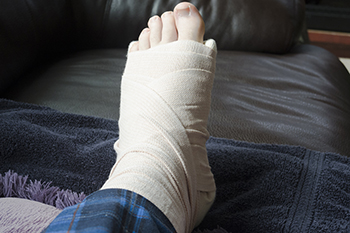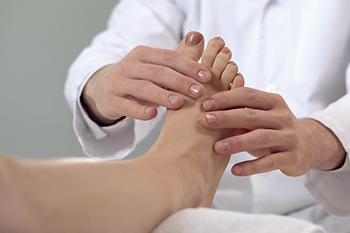
People that have fitness goals realize getting injured can be a huge setback and will disrupt completing goals on time. Preventing running injuries is an integral part of staying fit and healthy, and there are simple methods that can be implemented to accomplish this. It is important to take a day off from your chosen sport as this can give the body ample time to rest. When the training is intense, it is beneficial to follow an easier workout the next day, allowing the legs and body to recover. Research has indicated how important sleep is for physically fit individuals and cardiovascular performance may be hindered if sleep is deprived on a routine basis. Warming up and cooling down is an essential part of any workout routine because it provides the muscles with increased blood flow, in addition to alleviating muscle stiffness. There are several ways running injuries can affect the feet so it is suggested that you confer with a podiatrist who can guide you on additional methods for how to prevent them.
Exercising your feet regularly with the proper foot wear is a great way to prevent injuries. If you have any concerns about your feet, contact Bruce Smit, DPM of Frankfort Foot & Ankle Clinic. Our doctor will treat your foot and ankle needs.
How to Prevent Running Injuries
Many common running injuries are caused by overuse and overtraining. When the back of the kneecap starts wearing out and starts causing pain in your knee, this is commonly referred to as runner’s knee. Runner’s knee is a decrease in strength in your quadriceps and can occur if you’re not wearing properly fitted or supporting shoes. To prevent runner’s knee, focusing on hip strengthening is a good idea, as well as strengthening your quads to keep the kneecaps aligned.
What Are Some Causes of Running Injuries?
- One cause of a common running injury is called iliotibial band syndrome.
- Plantar fasciitis is also another common injury.
- Stress fractures can occur from overtraining, lack of calcium, or even your running style.
Best Ways to Prevent Running Injuries
- Wear footwear that fits properly and suits your running needs.
- Running shoes are the only protective gear that runners have to safeguard them from injury.
- Make a training schedule. Adding strengthening exercises as well as regular stretching can help keep you strong and limber and can lessen the possibility of injuries.
- Stretching keeps muscles limber; this will help you gain better flexibility.
If you have any questions please feel free to contact our office located in Frankfort, IL . We offer the newest diagnostic and treatment technologies for all your foot and ankle needs.

The risk of infection from a wound on the foot may be reduced when it is cleaned properly. The wound can be cleaned by rinsing it under running water for several minutes and covering it with a gauze pad. This is generally followed by applying a protective covering that is adequate to stop existing bleeding. If the wound is severe, pressure may be applied temporarily which may help to control bleeding. Diabetic patients may develop wounds on the feet more frequently than other patients. This may be a result of the inability to feel cuts, bruises, or wounds on the feet because neuropathy may be present. Wounds on the feet can be a serious matter, and it is strongly advised that you are under the care of a podiatrist who can properly evaluate why the wound and treat it accordingly.
Wound care is an important part in dealing with diabetes. If you have diabetes and a foot wound or would like more information about wound care for diabetics, consult with Bruce Smit, DPM from Frankfort Foot & Ankle Clinic. Our doctor will assess your condition and provide you with quality foot and ankle treatment.
What Is Wound Care?
Wound care is the practice of taking proper care of a wound. This can range from the smallest to the largest of wounds. While everyone can benefit from proper wound care, it is much more important for diabetics. Diabetics often suffer from poor blood circulation which causes wounds to heal much slower than they would in a non-diabetic.
What Is the Importance of Wound Care?
While it may not seem apparent with small ulcers on the foot, for diabetics, any size ulcer can become infected. Diabetics often also suffer from neuropathy, or nerve loss. This means they might not even feel when they have an ulcer on their foot. If the wound becomes severely infected, amputation may be necessary. Therefore, it is of the upmost importance to properly care for any and all foot wounds.
How to Care for Wounds
The best way to care for foot wounds is to prevent them. For diabetics, this means daily inspections of the feet for any signs of abnormalities or ulcers. It is also recommended to see a podiatrist several times a year for a foot inspection. If you do have an ulcer, run the wound under water to clear dirt from the wound; then apply antibiotic ointment to the wound and cover with a bandage. Bandages should be changed daily and keeping pressure off the wound is smart. It is advised to see a podiatrist, who can keep an eye on it.
If you have any questions, please feel free to contact our office located in Frankfort, IL . We offer the newest diagnostic and treatment technologies for all your foot care needs.

There is no mistaking a broken foot when it happens. It produces immediate pain and may be accompanied by bruising and swelling. This can be the result of a fall, or if a heavy object drops on the foot. Prompt medical attention is suggested, and it is difficult or impossible to walk on it. In severe fractures, the bone can protrude through the skin, and appear displaced. Having an X-ray taken is the most successful method to obtain a proper diagnosis, and this can help to determine the extent of the break. In some cases, a CT scan or MRI may also be used in addition to an X-ray, which may help to confirm the diagnosis. The majority of patients wear a boot or cast on the affected foot, and this is effective in stabilizing the foot as the healing process begins. Additionally, it is beneficial to elevate the broken foot as often as possible, which may reduce any existing swelling. If you have broken your foot, please contact a podiatrist who can begin the correct treatment for a broken foot.
A broken foot requires immediate medical attention and treatment. If you need your feet checked, contact Bruce Smit, DPM from Frankfort Foot & Ankle Clinic. Our doctor can provide the care you need to keep you pain-free and on your feet.
Broken Foot Causes, Symptoms, and Treatment
A broken foot is caused by one of the bones in the foot typically breaking when bended, crushed, or stretched beyond its natural capabilities. Usually the location of the fracture indicates how the break occurred, whether it was through an object, fall, or any other type of injury.
Common Symptoms of Broken Feet:
Those that suspect they have a broken foot shoot seek urgent medical attention where a medical professional could diagnose the severity.
Treatment for broken bones varies depending on the cause, severity and location. Some will require the use of splints, casts or crutches while others could even involve surgery to repair the broken bones. Personal care includes the use of ice and keeping the foot stabilized and elevated.
If you have any questions please feel free to contact our office located in Frankfort, IL . We offer the newest diagnostic and treatment technologies for all your foot and ankle needs.

Many people throughout the world take their feet for granted. The feet are complex structures and carry the weight of the body. Foot pain can happen when the feet are neglected, and this can make completing daily activities difficult to accomplish. When the feet feel good, a patient's overall attitude may be improved. There are simple methods that can be implemented that the feet can benefit from. These consist of washing the drying the feet daily, followed by using a good moisturizer, which may be helpful in preventing cracked heels. It is imperative that shoes are comfortable and fit correctly, which may be beneficial in helping to avoid unwanted foot conditions. It is suggested that high heels be worn infrequently, and the toenails are trimmed properly. Many people check the bottoms of their feet for existing cuts, bruises, or scrapes, and this is especially important for diabetic patients to do. If you would like more information about the importance of practicing everyday foot care, please confer with a podiatrist who can offer effective tips to maintain the health of the feet.
Everyday foot care is very important to prevent infection and other foot ailments. If you need your feet checked, contact Bruce Smit, DPM from Frankfort Foot & Ankle Clinic. Our doctor can provide the care you need to keep you pain-free and on your feet.
Everyday Foot Care
Often, people take care of their bodies, face and hair more so than they do for their feet. But the feet are a very important aspect of our bodies, and one that we should pay more attention to. Without our feet, we would not be able to perform most daily tasks.
It is best to check your feet regularly to make sure there are no new bruises or cuts that you may not have noticed before. For dry feet, moisturizer can easily be a remedy and can be applied as often as necessary to the affected areas. Wearing shoes that fit well can also help you maintain good foot health, as well as making it easier to walk and do daily activities without the stress or pain of ill-fitting shoes, high heels, or even flip flops. Wearing clean socks with closed shoes is important to ensure that sweat and bacteria do not accumulate within the shoe. Clean socks help to prevent Athlete’s foot, fungi problems, bad odors, and can absorb sweat.
If you have any questions please feel free to contact our office located in Frankfort, IL . We offer the newest diagnostic and treatment technologies for all your foot and ankle needs.